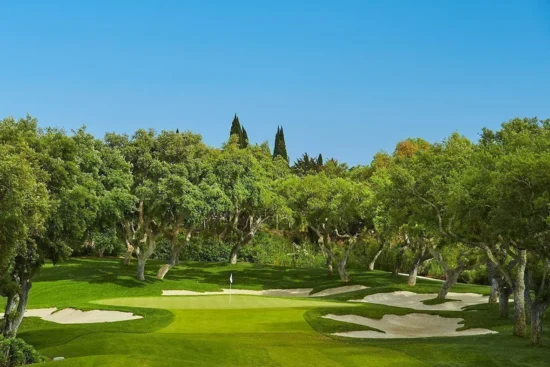

“The golf sector needs the authorities to support it as much as it deserves.”
Ángel de la Riva is aware of the difficulties that many golf courses are going through due to the persistent crisis, but even so, the president of the Royal Andalusian Golf Federation is optimistic about the future of the sector. When it comes to finding those responsible for some of the ills afflicting this ‘green industry’, the gentleman deals dialectical blows like no one else.
-How is the Andalusian golf sector responding to the crisis?
-Andalusia is very large and there are many different situations. The Costa del Sol is starting to revive.
There are no serious problems in the fields that belong to clubs and there are problems in the commercial fields, in some more and in others less. The large design courses have fewer problems than those that have been built, in general, in the last twenty years, which are having a hard time but are surviving.
In the Atlantic Cadiz the situation is very worrying, worse than in the rest of the provinces. Huelva, within the gravity, works better, perhaps because the Sevillians go more towards the coast of Huelva or because there are more golfers coming from Portugal. Although now a problem has arisen because they have raised the price of water to the golf courses in Huelva, why don’t they raise the price of water to irrigate strawberries, corn, potatoes, oranges or other crops?
De la Riva’s indignation has well-defined addressees: “Golf cannot be so much crushed. There is a total lack of culture on the part of the authorities who believe that the world of golf is for gentlemen. Cut the crap! The same thing happens with golf as with soccer: some go to covered grandstands with heating in winter and television, and others go to cheaper stands, but everyone goes to the course. It’s the same with golf: there are courses for all needs and for all budgets.
And the president of the RFGA continues with his analysis of the situation: “Andalusia depends on leisure, on the sun, which, thank God, we humans have not killed it yet. If it rains on the Costa del Sol, it rains in the north. We have to take advantage of this wonderful climate. Let the professionals sell our tourist products; well, no, instead of that, we are going to crush the entrepreneur, the one who has a business and who is struggling not to close it, and right now there are many golf courses that are thinking of closing down. All this is worrying and it seems that some authorities are not aware of it”.
De la Riva returns to his ‘review’ of golf in the Andalusian provinces: “Almeria is as it has always been, because historically they have had to fend for themselves, because they had bad communications, they were left by the hand of God, and they have an incredible power of work, sacrifice and to devise and invent. Now, with communications through Murcia, it is moving forward. Cordoba the same, Seville in the same way and Jaen has the problem of not being able to grow with the potential it has and it is a pity because there are only nine holes, in La Garza”. “In addition to the crisis”, he continues, “which has slowed down the projects of new courses, there are also serious administrative problems and it is not acceptable that, as has happened in Lucena, the Junta de Andalucía tells you ten years after starting the procedures that you have to start all over again. The investors, naturally, have been disappointed, because patience has a limit, and they have dissolved the company, so there will be no golf course in Lucena. This is sad, and it is much sadder that it is also the authority that stops it.
They must not be aware of the importance of a golf course, not only on a sporting level but also on an economic level, with the wealth and jobs it generates, first its construction and then its maintenance. It is very sad, but the authorities do not support the golf sector as much as it deserves”.
-When do you think Andalusia will overcome this economic slump and the golf courses will return to good occupancy figures?
-Well, when the countries that are our main markets for golf tourists come out of the slump. Those who were going to the Arab countries will go to the Canary Islands, those who are left over from the Canary Islands will come to Andalusia, there is tourist experience here, we have some magnificent courses, and when the general economic situation recovers, we will have a good situation here again. Germany, Holland, Denmark, England are starting to breathe… when these gentlemen have money for leisure, which is the first thing to be cut, they will come back to our land and play golf because it is wonderful here.
I have the feeling, and I say this in all honesty, that Andalusia -and it is my land- is not aware of knowing firstly what we have and secondly how we can improve it.
We think that we can live without making an effort, that maybe a subsidy will come, that maybe there is a plug, and we do not know all the potential that this land has, which for me, with all due respect to the rest, is the first in Spain. If all Andalusians started to work seriously for this land, we would be at the head of the country: neither Madrid nor Sebastopol. The best, Andalusia, because we have everything: a multiple orography, all kinds of offers, an incredible human wealth, that well directed can give much more of itself … now, if we direct it to suck from the canoe then we are in trouble. And this hurts me, that we do not take advantage of all the potential that this land has.
-What should be done in your opinion to attract more golf tourists to Andalusia?
-There are several things that are key and that are based on transmitting confidence, illusion, seriousness and professionalism. If you make an offer and when the tourist comes, it does not correspond to his expectations, then that person leaves disappointed and does not come back, and on top of that he makes bad publicity for the destination, and that goes for all sectors: golf, hotels, restaurants, cabs, beach bars…. We have to be good professionals and give the tourist an exquisite treatment. In the world of golf and tourism in general, we have to be one hundred percent professional. We have to be helpful, which does not mean servile, but serve with care and professionalism so that the tourist is satisfied and wants to repeat the experience.
Everyone in Andalusia has to be aware of the importance of tourism for this land, of all the jobs it generates, that it is our first industry and that we are facing increasing competition from other destinations. The times of fat cows are over: it is time to give the most of ourselves, to be more competitive, more productive so that tourists leave satisfied and eager to return.
The world of golf moves a lot by word of mouth, so you have to be serious about what you offer and give a quality according to the price. You have to keep your feet on the ground and be attentive to the evolution of supply and demand, and above all you have to provide a very professional and friendly service so that the golfer is satisfied.
The fields, of course, have to be in the best possible condition in terms of maintenance and presentation. It is a joint effort of all the staff of a field.
It is necessary to sow today to reap the fruits tomorrow, and until now, unfortunately, we were used to only reaping without almost sowing before. In Spain, and especially in Andalusia, with the subsidies, plug-ins, commissions and such harmful things, a lot of damage has been done and there is no concept of the professional work that we all have to have to be at the height of a land as unique as ours.















Leave a Reply